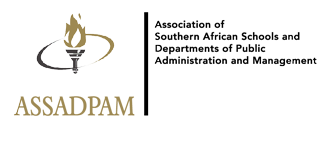Main menu
Conference | 2016

Annual conference and annual general meeting 25 - 27 October 2016, Cape Town, was hosted at the DoubleTree by Hilton Upper Eastside Hotel, Cape Town
The conference brought together academics and practitioners, students and young researchers in public administration and management, as well as contributors from any other disciplines who will exchange ideas on the following main theme: “Towards the Accountable State: Respecting Citizens’ Rights, Delivering Services”
Conference organisers
The conference was organised on behalf of ASSADPAM by the School of Government, University of the Western Cape, and the Department of Public Administration, Cape Peninsula University of Technology.
Conference Fees
ASSADPAM member
- You add R500 for 3 days of Conference to the price below: Including the workshop, refreshments and lunch during the day, conference material and gala dinner
- Conference 2 days: Including refreshments and lunch during the day, conference material and gala dinner.
- R 2300
- Register
Non-member
- You add R500 for 3 days of Conference to the price below: Including the workshop, refreshments and lunch during the day, conference material and gala dinner.
- Conference 2 days: Including refreshments and lunch during the day, conference material and gala dinner.
- R 2500
- Register
Student
- You add R500 for 3 days of Conference to the price below: Including the workshop, refreshments and lunch during the day, conference material and gala dinner
- Conference 2 days: Including refreshments and lunch during the day, conference material and gala dinner.
- R 1000
- Register
Amongst the thematic issues which will be addressed in the forthcoming conference will be whether weak oversight and accountability systems are inevitable in transitional democracies and hence are path determined; the extent to which the oversight policies and systems in place in Southern Africa states are appropriate to the needs of emerging economies and transitional democracies; and the measures which might be introduced to strengthen oversight mechanisms and promote more accountable states.
Amongst the potential topics for the conference would be the following:
- To what extent might conventional understandings of good governance be normative constructs, derived from Western rather than African experience, and what might the alternatives be?
- In the face of widespread corruption, with some notable exceptions, oversight institutions appear to be failing in their mandate to hold the public sector to account. Why might this be so and what might be done to strengthen their work?
- Is the developmental state model currently being pursued in a number of countries in the region likely to result in greater accountability and, if so, how will it accommodate democratic principles absent in the East Asian model of the developmental state?
- Public sector procurement systems and supply chain management are seen as key sites for corruption and misappropriation of public funds, yet why is the problem such a persistent one?
- Does decentralisation of administrative responsibility lead to weakened accountability?
- How do different systems of intergovernmental relations impact on accountability at different levels of government?
- To what extent do monitoring and evaluation systems provide a mechanism for effective oversight and accountability, and how might they be strengthened?
- How effective are participatory systems in ensuring public sector accountability (particularly at the local level) and how might they be strengthened?
- What is the role of e-governance in promoting greater state accountability?
- What role might networks and various forms of co-production play in ensuring more effective oversight?
- Public enterprises hold the potential to fast track economic development, but what type of governance regime would be necessary to ensure that they are held accountable to their government shareholder?
- To what extent are the academic courses taught in Public Administration promoting or undermining accountability systems?
DAY 1 TUESDAY 25 OCTOBER 2016
08:00 – 08:30 Registration
08:30 – 16:00 Emerging research article writing workshop / Venue: Madison
14:00 – 15:00 Administratio Publica editorial committee meeting / Venue: Queens room Dr Vain Jarbandhan (Editor Administratio Publica)
16:00 – 22:00 ASSADPAM EXCO meeting and dinner / Venue: Queens room Prof. Liezel Lues (Chairperson ASSADPAM)
DAY 2 WEDNESDAY 26 OCTOBER 2016
08:15 Meeting session chairs / Venue: Madison
08:30 – 09:00 Registration
09:00 – 09:15 Opening session and welcome / Venue: Central Hall
Prof. Liezel Lues (Chairperson ASSADPAM)
09:15-10:00 Guest Speaker
Dr Richard Levin (Principal National School of Government)
10:00 – 10:30 Tea
10:30 – 12:30 Session 1
Break away 1 / Venue: Central Hall
Session chair: Prof. Barry Hanyane (NWU)
GOVERNANCE (Group 1)
"The potential and limits of performance management: Improving basic education in the Western Cape R Cameron & B Levy (UCT)"
"Good governance through community participation: lessons learnt from South African experience GJ Davids & T Prins (NSG & UWC)"
"Local Government in a decentralized environment: the solution for accountable governance? H Kroukamp (UFS)"
"The role of governance networks in economic development: Lessons from Zambia C Madimutsa and LG Pretorius (University of Zambia and UWC)"
Break away 2 / Venue: Queens room
Session chair: Dr Vain Jarbandhan (UJ)
GOVERNANCE (Group 2)
"International instruments affecting persons with disabilities in SA: Viability for promoting democratic governance and citizen rights S Pillay, JD Taylor & A Govindjee (DUT & NMMU)"
"Delivering on growth and development in the Maritime Sector T Potgieter (NSG)"
"Leadership for good governance: the narcissistic demise L Vermeulen (NWU)"
"The role of coordinated planning and budgeting within the three Spheres of Government with specific reference to the Free State Local Government T van Niekerk (CUT)"
Break away 3 / Venue: Madison
Session chair: Ms Christa de Wet (NWU)
"The role of local government in using social innovation for improved service delivery: A 21st century strategy M Biljohn & L Lues (UFS)"
"A critical analysis of youth participation in Development Programmes: a case study of the Xhariep district municipality B Kruger & A du Plessis (UFS)"
"Managing municipal audit compliance with organisational work procedures: A theory of planned behaviour approach O Nzewi (UFH)"
12:30 – 13:15 Lunch
13:15 – 14:30 Annual general meeting / Venue: Central Hall
14:30 – 16:30 Session 2
Break away 1 / Venue: Hudson
Session chair: Prof. Ogochukwu Nzewi (UFH) PUBLIC ACCOUNTABILITY
Understanding the effectiveness of the Justice System in holding government accountable: An analysis of major court judgments against the state MA Okbandrias (UWC)
Legislative oversight and accountability effectiveness in ensuring transformation is achieved in the Petroleum downstream of SA I Ile & M Makiva (UWC) "Evaluation of effective oversight and accountability in the Energy Sector of South Development, Public Policy, and the unhealthy African Developmental Trajectory K Wotela (WITS)"
"Environmental Justice and Mining in SA NS Matsiliza (CPUT)"
Break away 2 / Venue: Queens room Session chair: Ms Mareve Biljohn (UFS) PUBLIC POLICY
"The complex dynamics of evidence-informed policy change F Cloete (CPUT)"
"Policy implementation effectiveness pertaining to transformation by historically disadvantaged South Africans: The Petroleum downstream of SA I Ile & M Makiva (UWC)"
"The mirage of the developmental state in South and Southern Africa A Karriem, M Hoskins & L Pretorius (UWC)"
"Evidence based policy making: knowing what you do not know you don’t know K Wessels (UNISA)"
Break away 3 / Venue: Madison
Session chair: Mr Ambrose du Plessis (UFS) PUBLIC ADMINISTRATION CURRICULUM
"Towards a paradigm of decoloniality in African Public Administration BR Hanyane (NWU)"
"Re/aligning disaster risk management curriculum in universities in SA B Ngcamu & A Whitaker (CPUT)"
19:00 Gala dinner
DAY 3 THURSDAY 27 OCTOBER 2016
08:30 – 09:30 "Integrated Learning Session chair: Dr Strini Pillay (DUT) Venue: Central Hall Presenter: Shakeel Ori: Director : Co-operative Education"
09:30-10:00 Tea
10:00 - 11:30 Session 3
Break away 1 / Venue: Central Hall Session chair: Prof. Fanie Cloete (US) SERVICE DELIVERY
"Determinants of Basic Service Delivery: the case of Amathole District Municipality S Maclean & N Memani (NMMU)"
"Public Participation and the Precipitators of Protest: a case study of Administrative factors giving rise to service delivery protest in two Municipalities in SA C Tapscott & G Ruiters (UWC)"
The power of the marginalised: citizen engagement through social movements in SA PT de Wet & L Thompson (UWC)
Break away 2 / Venue: Queens room Session chair: Prof. Tryna Van Niekerk (CUT) MONITORING & EVALUATION
The quality reviews at Internal Audit Departments at Municipalities in SA L Mamaile (UJ)
"The case in favour of the Dashboard Theory in Monitoring for Performance Improvement EA Ndaguba & EOC Ijeoma (UFH)"
"Theorizing and operationalizing the fit and proper person construct in public administration in pursuit of informed accountability VA Clapper (UNISA)"
Break away 3 / Venue: Madison Session chair: Ms A Whitaker (CPUT) ELECTIONS
"The State-Government-Citizens Interface in Africa’s Democracies: experiences from Uganda’s 2016 Elections BC Basheka (Uganda Technology and Management University)"
"Local government elections as a tool to promote public participation and accountability BR Hanyane & M Diedericks (NWU)"
"Reflection on the nexus between e-Government and Poverty Reduction: A perspective from Msunduzi Municipality, KZN M Subban & OE Okeke-Uzodike (UKZN)"
11:30 Closing Prof. Liezel Lues / Venue: Central Hall Announcement best conference paper presented Announcement best conference paper by upcoming academic Announcement of the 2017 conference host
12:00 Lunch
Announcement best conference paper presented
Announcement best conference paper by upcoming academic
Announcement best conference paper by upcoming academic
12:00 Lunch
Abstracts must be submitted to
 Natalie Seymour. Please note that
Natalie Seymour. Please note thatsubmission of an abstract entails a commitment to attend and present a paper should the abstract be accepted.
The selection of contributions will be done according to the following criteria:
· Orientation
· Research purpose
· Motivation for the study
· Research design, approach and method
· Main findings
· Practical/managerial implications
· Contribution/value-add
Feedback to authors: 20 July 2016
Notification of acceptance or non-acceptance of papers will be e-mailed to the author(s) by 20 July 2016.
The selection of contributions will be done according to the following criteria:
· Relevance to the conference theme
· Clarity of purpose and method applied
· Significance, originality of the content of the proposal
Final papers: 20 September 2016
Papers must be submitted to
 Natalie Seymour.
Natalie Seymour.Registration closes: 20 September 2016
Any abstracts and papers must be submitted to
 Natalie Seymour. Please register for the 2016 Conference.
Natalie Seymour. Please register for the 2016 Conference.Failure to register by the presenting author will automatically result in the Abstract being removed from the final programme.
Below please find the Breakdown of Accommodation Rates for Hotels Around Cape Town for the October Conference:
If your delegates would like to book at any of these hotels for the Rates listed below they will have to give Keyside Conference as Reference or they can book it through us, by emailing Romy | romy [at] keyside.co.za
HOST Hotel
Double Tree by Hilton Upper East Side Hotel ( Booking code BB ID1038952) please use the booking code for this Hotel
- Single Rate : R 1 415.00pp B&B
- Double Rate : R 1 645.00 per sharing room B&B
Various Hotels Around the CBD
Protea Hotel Victoria Junction
- Single Rate : R 2 540.00pp B&B
- Double Rate : R 2 975.00 per sharing room B&B
Strand Street Tower Hotel
- Single Rate : R 1 680.00pp B&B
- Double Rate : R 1 900.00 per sharing room B&B
Airport Transfers can be arranged as well, email | romy [at] keyside.co.za
ASSADPAM
Welcome to the website of the Association of Southern African Schools and Departments of Public Administration and Management (ASSADPAM). ASSADPAM is a professional network of higher education schools and departments in the disciplines of Public Administration, Public Management, Public Governance and Development Management in Southern Africa. It was established in its current format in 2002 to promote the interests of these disciplines and of the scholars active in these fields.
Privacy-Statement | Terms of use | ASSADPAM ©


